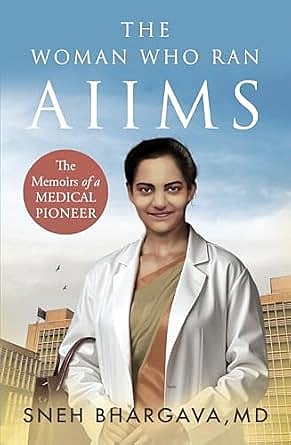The First Woman to Head AIIMS Writes a Gripping Memoir

How does one remember a life of nearly a century when one has lived through history and indeed, made history? Dr Sneh Bhargava looks back on her life at 95 and takes us along on the fascinating journey. She spent her childhood in Lahore but was uprooted and had to migrate to India during Partition. She remembers the train journey, but also recalls disarmingly, “It was a journey full of terror, though I must confess that as a 17-year-old, I was preoccupied with my exams, which had been delayed by the political turmoil.” She chronicles her medical studies, the difficult choice of which subject to specialise in and her almost reluctant decision to join the department of radiology. But once she chose it, she realised there was much to be done since radiology services were very basic in India. On the advice of her mentor Dr Gadekar, Bhargava went abroad to study radiology and made use of every opportunity to improve her knowledge and skills. She returned to India and joined the All-India Institute of Medical Studies (AIIMS) in 1960, becoming the head of the department of Radiology in 1970 and was made the Director of AIIMS in 1984. In her memoir Bhargava writes about her efforts to improve the quality and scope of radiological services at AIIMS, arguing her case with the health ministry for a share of scant resources to upgrade facilities—be it better X-ray machines, CT scan machines or an ultrasound machine.
Bhargava retired from AIIMS in 1990 when she turned 60, and went on to work for another 30 years in two non-profit hospitals, improving the services in one, and helping to set up the second. She stopped working formally in 2020 during Covid when she turned 90.
Bhargava’s career as a doctor began at a momentous time in India’s history—when Independence had recently been won and the process of nation-building was just beginning. She was motivated by the same zeal and ideals of so many of her time, aiming to realise the goals with which AIIMS had been set up by Rajkumari Amrit Kaur—to make AIIMS with “the mission to pursue education, medical services and research.” To this end Bhargava worked tirelessly to improve the radiology services in AIIMS and to set standards that the rest of the nation could follow. She was a visionary who saw opportunities for expanding the scope of radiological services and encouraged juniors to pursue specialities in radiology and to start their own sub-speciality branches.
Openomics 2026: Continuity and Conviction
06 Feb 2026 - Vol 04 | Issue 57
The performance state at its peak
Bhargava’s sense of purpose and her determination come through in her memoir—whether it is as head of department or as Director of AIIMS. She learnt to pick her battles but never compromised on matters that would adversely impact patient care. While she has taken pains to explain medical terms and procedures in simple terms, her listing of all the doctors she worked with at various times, by name, could have been avoided. What comes through her memoir is also her constant focus on the poor—whether it is worrying about where relatives of patients would stay during the course of treatment, or when reclaiming encroached land belonging to AIIMS, she first ensured alternative land with water and electricity facilities for the displaced slum residents.
Bhargava’s memoir is an engaging read, a journey through time and the evolution of radiodiagnosis in the past century. It is also the story of an extraordinary woman—a pioneer in the field of radiodiagnosis in the country, who built the department in AIIMS from an obscure one into one of vital importance to the care of the patient. It is also the story of a woman who managed multiple roles—of a doctor, a mother, a wife, a teacher and mentor, and yet retained her work-life balance, with an endless zest for life.

